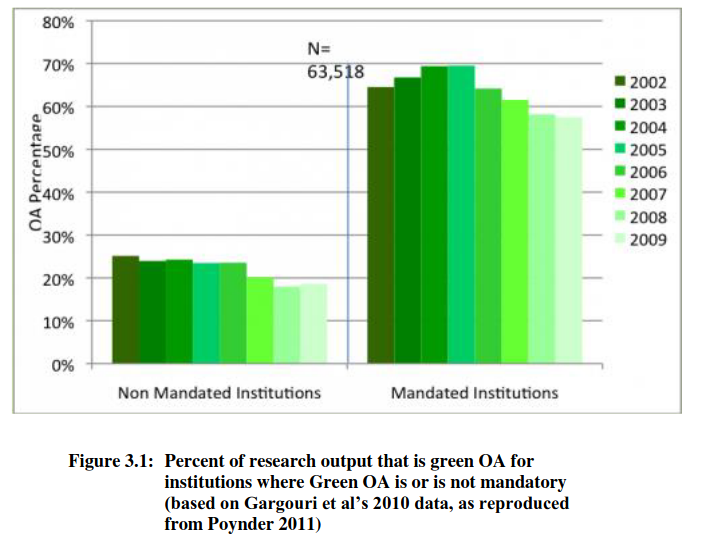1.2 Policies and Mandates for Open Access
Retaining proper value of the words mentioned in the Berlin Congress and to promote open access, mandate is necessary. The view of Steven V. Hyman, provost of the Harvard University in the context of open access is worth mentioning.“The goal of university research is the creation, dissemination, and preservation of knowledge. At Harvard, where so much of our research is of global significance, we have an essential responsibility to distribute the fruits of our scholarship as widely aspossible.” Though, it is mentioned in the context of universities, it holds equally good for all agencies generating scholarly communication and to distribute fruits of scholarships as widely as possible, for which developing a policy is of utmost importance. After implementation of open access mandates no special initiatives need to be undertaken to convince researchers to deposittheir research outputs soon after publication. It happens naturally under mandatory OA policiesBefore a mandatory policy is established, documents dribble in to the repository even many years after the date of publication. Once a mandatory policy is established, the pattern changes dramatically (Sale, 2006). OA experts show in their research works that Mandates/Mandatory Policies adopted by institutions, organizations or funding agencies are populated by contributors quickly and hugely in comparison with the institutions that don't have OA mandate. A graphical representation of increasing parameter of self-archiving is shown in Figure 3.1, which is also re-mentioned later by Richard Poynder in an interview.

This figure shows that open access mandates make article submission in institutional repositories three times more than non-mandated institutions. Open Access Mandate is a condition/provision that has been taken up by various institutions organizations and funding agencies to make sure the free hand for reusing, remixing, redistribution of scholarly objects. According to Peter Suber, Open Access Mandate is “a condition on a voluntary contract, not an unconditional requirement. It’s a reasonable condition as well, since public funders, like NIH, disburse public money in the public interest, and private funders, like the Wellcome Trust, disburse charitable money for charitable purpose.” In this context it is mentionable that in his book “Open Access”, Peter Suber draws a line between Policy and Mandate. He is much more comfortable to use “Contract” instead of “mandate”. First open access mandate’s initiative was taken by the School of Electronic & Computer Science at the University of Southampton, UK in 2002 (Swan, 2012). By this, open access mandate’s authors of that school, are bound to deposit their Post-prints in schools repository. In the same year, in 2003, UK parliaments’ Science and Technology Committee recommended a funder-based mandate policy in its 2003-2004 report. US House of Representatives voted to set conditions for federal grant recipients. Following the various declarations (Budapest Declaration, Berlin Declaration), and recommendations (viz., World Summit on Information Society, OECD Declaration on Access and to Research Data from Public Funding), “ several importantresearch funding bodies have established policies urging their funded researchers to publish in open access journals”. First institution based mandate/policy was adopted at QUT in Australia. There are now more than three hundred institutions, funding institutions all over the world that have implemented OA policy (Xia et al., 2012) and in 2009-2010 the implementation of open access mandate’s rate was higher than ever. The most comprehensive and strong open access mandates of NIH (National Institutes of Health) and the Harvard Faculty of Arts and Sciences were established in the year 2008. OpenDOAR survey (2006) identified about two thirds of open access repositories did not have publicly stated policies for the permitted re-use of deposited items or for such things as submission of items, long term preservation, etc. In a survey for OpenDOAR in early 2006, Peter Millington discovered that about two thirds of Open Access repositories did not have publicly stated policies for the permitted re-use of deposited items or for such things as submission of items, long term preservation, etc. This complicates matters for organizations wishing to provide search services, which in turn reduces the visibility and impact of these repositories. There are two ways of open access - Green and Gold. Open access mandates are applicable for both of these provisions. Till date, there is no exclusive mandate for gold open access. Almost all available mandates are related with green open access.
